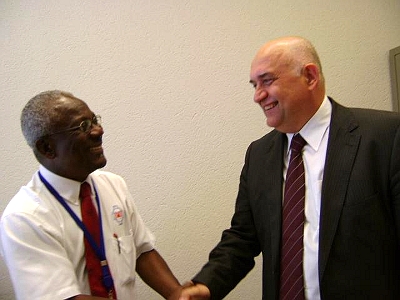Interview met Sir Roy Trotman Vice-president of the Conference of ILO
Interview met Sir Roy Trotman Vice-president of the Conference of ILO

Roy Trotman en Rudy De Leeuw
Why is the ILO important for workers?
RT: The
ILO is important for many reasons. One, its gives ordinary men and
women, who are workers, a chance that they do not get from other
organizations, to say a single word in their defense. The ILO allows
employers, allows workers and their representatives to be able to say
how the world can be made better. Secondly, it sets standards. The
people of the world - employers, governments - are more concerned about
making money and some are getting rich, a few people remember the
conditions of the people that create the wealth, who work. The ILO sets
standards that people must be able to live by, minimum standards, you
can get better ones, and it’s important! Thirdly, we workers consider
that they are disadvantaged and that they need some place or someone to
express their problems. Those workers are able through their
trade-unions to be represented in a kind of supervisory body, like a
court, to express their grievances and to get some kind of assistance.
And another reason is that those workers organizations and employers
organizations to and gouvernements wheather they are weak in their
labour departments have a possibility for going to a body of experts,
who have the required expertise to help them, to train them, and to
give them technical support to make their organizations better so that
the ordinary persons can get better support from their labour
department, better support from their unions and the employers can get
better support so that their HR-departments are better runned
Why
is this Conference important for the workers of Belgium and the workers
of other countries? What can you say to the workers in Belgium?
RT: The
first thing I would say is that for your delegation although it was
beautiful weather, you were not by the lakeside, you were not enjoying
Geneva or the mountains. We take a long time at these meetings because
we endeavour to discuss conditions which can make the workplace better.
On this occasion we tried to get improve conditions for women at the
workplace. We were dealing with gender equality. We were also dealing
with the matter of improved treatment and greater respect for people
who are suffering from HIV and AIDS. And we were trying to have people
understand across the world that we cannot dismiss or discriminate
against people who are suffering from that particular disease. The
third technical issue we were talking about relates to that major
crisis we have now in the world, it is the financial crisis, the crisis
of the economy and the social crisis that is coming from it. We have
been endeaouvering gouvernements, employers and workers to find a
common position, that would satisfy the real economy. People who
actually create wealth, that would satisfy them as to means through
which we can make everybody better of. The poor could become less poor
and those who are living in the rich countries but who are themselves
poor, that their conditions could be approved as well. This has made
this conference extraordinary and very special.
What is your opinion about the final text of the
Committee of the Whole
on crisis responses? Are you happy with it or could it be better?
RT: A
text can always be better, but the text was prepared by governments on
the one hand, the employers on the other hand and the workers. It was
always prepared by rich countries and poor countries, developed
countries and developing countries. It has to be a single text that
satisfied all of these views. It is an excellent text, the workers
would have liked to see in it reference progressive taxation, so that
the very rich could contribute more of what they have earned through
the blood and the tears of workers to create a new society. But
governments don’t want that and employers don’t want that, it are only
the workers who want progressive and fairer taxation. But outside of
that, we would want to encourage workers and trade unions to try to
have discussion groups, training programs or anything else of this
sort, where people can understand paragraph by paragraph what this text
is offering to governments, employers and workers and how this document
can be used to make this world a better place.
How do you see the future of this text and the ILO?
RT: The
text is like any other text. It can be taken back to our country and
can be placed in the libraries or museums or something. It will only be
good if the people, if the trade unions in your country and in my
country, if the employers in your country and my country and if the
governments, especially in the developed countries will used the
resources they have committed to donating, will use that resources in
the future to remove poverty from the world in the form that it now
exist and try to create a better society for all of us.
We will do our best. Thank you very much for this interview.
Nieuwslijnmeer

- Indymedia.be is niet meer
- Foto Actie holebi's - Mechelen, 27 februari
- Lawaaidemo aan De Refuge te Brugge
- Recht op Gezondheid voor Mensen in Armoede
- Carrefour: ‘Vechten voor onze job en geen dop!’
- Afscheid van Indymedia.be in de Vooruit in Gent en lancering nieuw medium: het wordt.. DeWereldMorgen.be
- Reeks kraakpanden in Ledeberg met groot machtsvertoon ontruimd
- Forum 2020 en de mobiliteitsknoop
- Vlaamse regering kan niet om voorstel Forum 2020 heen (fietsen)
- Fotoreportage Ster - Studenten tegen racisme


















